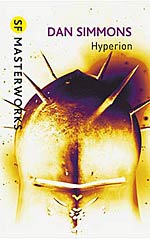
![]() BigEnk
BigEnk
11/21/2024
![]()
The story of the seven last pilgrims sent to the Time Tombs on the mysterious and far-away world of Hyperion, where the metal instrument of death known as the Shrike prowls. As every other review of Hyperion has already said, it's told in the style of The Canterbury Tales, something that I've never read myself. Each of the pilgrims, in turn, tell the story about why they were personally selected for the journey, and the events surrounding their connection with the planet or with the Shrike. In my opinion, this style of storytelling is one of the strongest elements of the novel. It's just an engaging way to read a story. However, not all of the stories are created equal.
The first story, the priests tale, is one of the best novellas that I've ever read, one of the best SF stories I've read. It's the major reason that Hyperion is getting a high score from me. It's something that could totally be read independently from the rest of the text, so at least there's that. The writing is stellar. Simmons shows that he can craft prose that is not only beautiful, but also engages the reader and tells them about the world at the same time. There's a palpable sense of dread, and horror as the story plays itself out, and a high strung tension that made me completely incapable of putting it down. Simmons is especially fond of and good at describing lighting, including sunsets, light shafts in building, and the diffused quality of twilight. It's also incredibly memorable. The main character, the Tesla trees, the cruciform, the Shrike himself. I only wish that the quality of this first tale continued into the rest of the book.
Some of the other tales are good to passable in quality, and while they aren't nearly as good as the first, they are at least good enough to deserve a place in the novel. The scholar(a father/daughter story), the consul(an environmental and colonization themed love story) , and the solider(a historical fiction action love story) all fit into this category to me. Sometimes they were a little bit on the nose, overly saccharine, sometimes even cringy, but they were fine for the most part. If nothing else, they were good ways to see glimpses into the larger world of the hegemony. I appreciate that the world of the hegemony feels expansive. I'm also glad that Simmons made an attempt to create historical events that took place between our known history, and the time of the book, something that I think is sorely missing from a lot of SF epics.
Unfortunately, both the scholars tale and the detectives tale were sore thumbs compared to the rest. The story of the scholars tale was interesting, and I think could have been passable, but the scholar himself is so annoying that he ruined the story. Some of this annoyance even bleeds out into the interstitial material in between the tales. Why make him so annoying to read? It seems to serve no purpose to the story or the character. If you don't find his character so annoying, I'm sure that his tale would be more palatable. The detectives tale was by far the worst. At times I was astounded that it was written by the same person who wrote the priests tale. Not only is the quality far lower than the rest, but the tone clashes with the rest as well. Maybe I just don't like detective stories, but Jesus, I think it's objectively bad.
Finally, I'd like to talk about the ending. It sucked. It's a total non-ending. I've talked about my opinion on books that are written with a sequel in mind, and they aren't favorable. I think the reader deserves some sort of closure after reading such a lengthy novel. As it is, Hyperion ends not just without an ending, but without a climax entirely. It's the literary form of spiteful edging. 500 pages of build up to an event that doesn't even happen. Now, I'll also note that I like a story that ends with some form of ambiguity, something that keeps you curious and thinking about it afterwards. If you've given enough pieces of puzzle to the reader, you can let them forms those last pieces themselves, entertaining multiples ways in which things fit together. This is not the case with Hyperion. Simmons gives you all of the edge pieces of the puzzle, with the middle completely missing, flips you off, and says "Guess you'll have to read the next one, dickhead".
This is probably the most negative review I've ever had for a book that I've rated so highly, and that speaks to how good the priests tale is. God, if only Simmons could've kept that same quality throughout. Or at least finished the book with some sort of conclusion. As it stands, Hyperion has some of the largest wasted potential I've ever seen. It could've been one of the gold standards of the genre, which I guess it still is for lots of folks. I still find myself struggling to reconcile these diametrically opposed feelings I have towards it. Ultimately though, I think that's a point in it's favor. At least it elicits strong opinions, in both directions. Hyperion is easy to talk about passionately. There's a lot of things you can say about it, but hey, at least it doesn't fall into the doldrums of mediocrity.